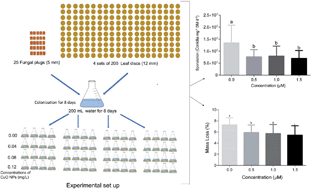Short-term exposure to low concentrations of copper oxide nanoparticles can negatively impact the ecological performance of a cosmopolitan freshwater fungus
Abstract
In the past few decades, the use of nano-based products has been expanding, subsequently increasing the risk of aquatic contamination by nanoparticles (NPs). Consequently, it is important to assess the potential risks of environmentally realistic concentrations of NPs. Leaf litter decomposition, a fundamental ecological process in headwater streams, is governed mainly by fungi. In this study, copper oxide nanoparticles (CuO NPs) were synthesised, and the influence of short term exposure to low concentrations of copper oxide nanoparticles on leaf litter decomposition and fungal reproduction (sporulation) was assessed. A cosmopolitan aquatic fungal decomposer species Articulospora tetracladia was used to assess litter decomposition upon exposure to CuO NPs (0.00, 0.04, 0.08 and 0.12 mg L−1) for a short time period (1, 2, 3 and 4 days). Concentrations and exposure time of NPs affected both leaf litter decomposition and sporulation. A significant difference in leaf litter decomposition and fungal sporulation was observed between the control (0.0 mg L−1) and all concentrations tested but not between 0.04, 0.08 and 0.12 mg L−1 of NPs. All the exposure time points (1, 2, 3 and 4 days) had a significant impact on sporulation; however a significant difference in leaf litter mass loss was seen between all time points except for between 2 and 3 days. Overall, our study provides a novel insight into the potential risk of short-term exposure to environmentally realistic concentrations of CuO NPs on the ecological performance of a cosmopolitan freshwater fungus.



 Please wait while we load your content...
Please wait while we load your content...